Related Research Articles
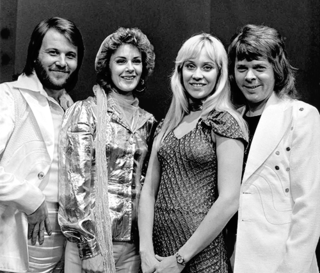
ABBA are a Swedish pop group formed in Stockholm in 1972 by Agnetha Fältskog, Björn Ulvaeus, Benny Andersson, and Anni-Frid Lyngstad. The group's name is an acronym of the first letters of their first names arranged as a palindrome. One of the most popular and successful musical groups of all time, they became one of the best-selling music acts in the history of popular music, topping the charts worldwide from 1974 to 1983, and in 2021. ABBA have achieved 48 hit singles.

Exile on Main St. is the 10th British and 12th American studio album by the English rock band the Rolling Stones, released on 12 May 1972 by Rolling Stones Records. Recording began in 1969 in England during sessions for Sticky Fingers and continued in mid-1971 at a rented villa in the South of France named Nellcôte while the band lived abroad as tax exiles. A collage of various images, the album's artwork, according to frontman Mick Jagger, reflects the Rolling Stones as "runaway outlaws using the blues as its weapon against the world", showcasing "feeling of joyful isolation, grinning in the face of a scary and unknown future".

Obscured by Clouds is the seventh studio album by the English progressive rock band Pink Floyd, released on 2 June 1972 by Harvest and Capitol Records. It serves as the soundtrack for the French film La Vallée, by Barbet Schroeder. It was recorded in two sessions in France, while Pink Floyd were in the midst of touring, and produced by the band.
"Without You" is a song written by Pete Ham and Tom Evans of British rock group Badfinger, and first released on their 1970 album No Dice. The power ballad has been recorded by over 180 artists, and versions released as singles by Harry Nilsson (1971), T. G. Sheppard (1983) and Mariah Carey (1994) became international best-sellers. The Nilsson version was included in 2021's Rolling Stone's 500 Greatest Songs of All Time. Paul McCartney once described the ballad as "the killer song of all time".

Saint-Manvieu-Norrey is a commune in the Calvados department in the Normandy region in northwestern France.

"Popcorn" is an instrumental composed by Gershon Kingsley in 1969 for the album Music to Moog By on Audio Fidelity Records label.

Sticky Fingers is the 9th British and 11th American studio album by the English rock band the Rolling Stones, released on 23 April 1971 on their new, and own, label Rolling Stones Records after previously having been contracted by Decca Records and London Records in the UK and US since 1963. It is Mick Taylor's second full-length appearance on a Rolling Stones album, and the first studio album without Brian Jones who died two years earlier. The original cover artwork, conceived by Andy Warhol and photographed and designed by members of his art collective, The Factory, showed a picture of a man in tight jeans, and had a working zipper that opened to reveal underwear fabric. The cover was expensive to produce and damaged the vinyl record, so later re-issues featured just the outer photograph of the jeans.
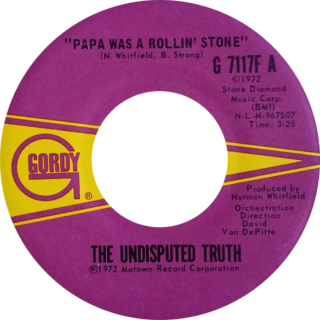
"Papa Was a Rollin' Stone" is a song originally performed by Motown recording act The Undisputed Truth in 1972, though it became much better known after a Grammy-award winning cover by The Temptations was issued later the same year. This latter version of the song became a number-one hit on the Billboard Hot 100.
"Killing Me Softly with His Song" is a song composed by Charles Fox with lyrics by Norman Gimbel. The lyrics were written in collaboration with Lori Lieberman after she was inspired by a Don McLean performance in late 1971. Lieberman released her version of the song in 1972, but it did not chart. In 1973 it became a number-one hit in the United States, Australia and Canada for Roberta Flack, also reaching number six in the UK Singles Chart. In 1996, Fugees recorded the song with Lauryn Hill on lead vocals, their version became a number-one hit in twenty countries. The version by Flack won the 1974 Grammy for Record of the Year and Best Female Pop Vocal Performance, and the version by Fugees won the 1997 Grammy for Best R&B Performance by a Duo or Group with Vocal. The song has been covered by many other artists. Both versions by the Fugees and Roberta Flack were placed on the 2021 revised list of Rolling Stone's 500 Greatest Songs of All Time.

"Ben" is a song written by Don Black and Walter Scharf for the 1972 film of the same name. It was performed by Lee Montgomery in the film and by Michael Jackson over the closing credits. Jackson's single, recorded for the Motown label in 1972, spent one week at the top of the Billboard Hot 100. Billboard ranked it as the number 20 song for 1972. It also reached number 1 on the ARIA Charts, spending eight weeks at the top spot. The song also later reached a peak of number 7 on the UK Singles Chart. In 2004, the song appeared in The Ultimate Collection.

"Nights in White Satin" is a song by the Moody Blues, written and composed by Justin Hayward. It was first featured as the segment "The Night" on the album Days of Future Passed. When first released as a single in 1967, it reached number 19 on the UK Singles Chart and number 103 in the United States in 1968. It was the first significant chart entry by the band since "Go Now" and its recent lineup change, in which Denny Laine and Clint Warwick had resigned and both Hayward and John Lodge had joined.
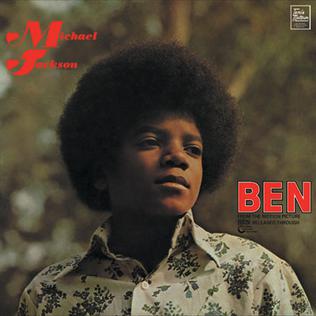
Ben is the second studio album by American singer Michael Jackson, released by Motown Records on August 4, 1972, while Jackson was still a member of The Jackson 5. The album received mixed reviews from contemporary music critics. Ben was more successful on the music charts than Jackson's previous studio album, having charted within the top 10 on the Billboard 200. Internationally, the album was less successful, peaking at number 12 in Canada, while charting within the top 200 positions in Australia and France.

"Brandy", later called "Mandy", is a song written by Scott English and Richard Kerr. It was originally recorded by English in 1971 and reached the top 20 of the UK Singles Chart.
Biathlon at the 1972 Winter Olympics consisted of two biathlon events, held at Makomanai Biathlon Site. The events began on 9 February and ended on 11 February 1972.
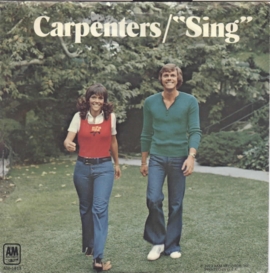
"Sing" is a 1971 song written by Joe Raposo for the children's television show Sesame Street as its signature song. In 1973, it gained popularity when performed by the Carpenters, who made it a #3 hit on the Billboard Hot 100.
Brian Edward Gottfried is a retired American tennis player who won 25 singles titles and 54 doubles titles during his professional career. He was the runner-up in singles at the 1977 French Open, won the 1975 and 1977 French Open Doubles as well as the 1976 Wimbledon Doubles. He achieved a career-high singles ranking on the ATP tour on June 19, 1977, when he became world No. 3, and a career-high doubles ranking on December 12, 1976, when he became No. 2.

"Metal Guru" is a song by the British rock band T. Rex, written by Marc Bolan. It was the band's fourth number one on the UK Singles Chart when it topped the chart for four weeks from May–June 1972. It was also included on the album The Slider in 1972.

"Clair" is a song by Gilbert O'Sullivan, released in 1972 as the first single from his second album Back to Front. It was written by O'Sullivan and produced by Gordon Mills, and is one of O'Sullivan's biggest-selling singles.
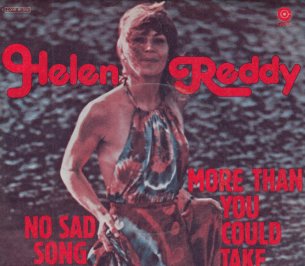
"No Sad Song" is a song written in 1971 by Carole King and Toni Stern. It was recorded by Australian singer-songwriter Helen Reddy, appearing on her album Helen Reddy, released in November 1971. The single peaked at number 62 in January 1972 on the Billboard Hot 100 chart, staying on the chart for eight weeks. "No Sad Song" showed up on the Easy Listening chart for 4 weeks, rising to number 32. It also reached number 51 on the pop chart in Canada's RPM magazine.
References
- ↑ Archives on "InfoDisc" site Archived 2014-03-30 at the Wayback Machine